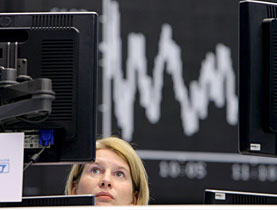
Failed bank rescue seen as challenge for Europe

The Swiss press has strongly criticised US legislators who rejected the $700 billion (SFr767 billion) bank rescue plan – and has hit out at European politicians too.
“A wake up call for Europe,” was the title of the commentary in Tuesday morning’s Tages-Anzeiger newspaper of Zurich, echoed by Le Temps of Geneva: “A challenge for Europe”.
The Tages-Anzeiger says that Europe lulled itself into a false sense of security at the beginning of the financial crisis in the United States, contrasting the “wild west capitalism” on the other side of the Atlantic with the “civilised customs” of Europe.
“Naturally they didn’t want to prepare for a bank crisis which as far as the EU politicians were concerned couldn’t happen,” the paper says. Even now, it adds, they are “incomprehensibly hanging back”.
While admitting that some individual states can still rescue failing financial enterprises by pouring in tax money, “improvisation and money” may soon not be enough.
“In the long term the members of the European Union must overcome their national selfishness and centralise their scattered financial markets,” it says. It calls on the Europeans to get together urgently to come up with a collective rescue plan for their threatened banks.
Le Temps makes a similar call. It says Europe has always been “incredibly clumsy” when faced with emergencies.
“Europe – and Switzerland – can help to calm things down by creating a common kitty to consolidate the banks,” it says.
Weak politicians
The Neue Zurcher Zeitung warns that the financial crisis has now entered a new stage, and it is essential to “get a grip on the crisis as soon as possible, before it enters a third, dangerous stage, when customers start withdrawing their money regardless of the health of their bank”.
It calls on politicians to give a clear message to build confidence to avoid such a chain reaction.
Other papers wring their hands over the US politicians who turned down the bailout deal. “The election campaign is more important than saving the world”, headlines the German-language tabloid Blick.
The Bund of Bern explains that the rescue plan was highly unpopular with US voters. It regrets that “no politician with national charisma has taken the trouble to explain to simple taxpayers the background and implications”.
It says the bankbenchers of the House of Representatives may have wiped out billions of dollars on the stock exchanges with their vote, but have made one thing clear, namely that “there is an urgent need for more work to be done to enlighten them about the rescue package”.
European stock exchanges had already fallen sharply at the close on Monday, before the House vote was taken, reflecting fears that the plan might fail. Zurich lost 4.63 per cent.
Traders were reported to be expecting further losses on Tuesday. The atmosphere in the Zurich exchange ahead of opening was described as “tense calm”.
swissinfo, Julia Slater
The turmoil on the financial markets was sparked by the subprime crisis in the US, where borrowers were granted mortgages they were unable to pay back.
This led to a shortfall in liquidity in financial institutions, making it harder for them to carry on their business.
Since March, JPMorgan Chase has taken over the investment bank Bear Stearns and Bank of America has acquired rival Merrill Lynch.
The British Barclays bank agreed to acquire part of the US investment bank Lehman Brothers after it filed for bankruptcy protection.
The US government has bailed out mortgage lenders Fannie Mae and Freddie Mac and the insurance giant AIG.
European institutions have also been affected.
In Britain several major mortgage banks have had to be rescued or taken over.
The authorities in the Benelux countries have stepped in to rescue the giant Fortis banking and insurance company.
Germany’s Hypo Real Estate mortgage lenders has been bailed out by other banks and the government.
In Iceland the government has taken control of the country’s third biggest bank.
The $700 billion bank rescue plan hammered out by the US administration and leaders of both Republican and Democrat parties was supposed to stop the collapse of financial institutions by injecting the necessary finance to enable them to continue trading.
It was highly unpopular in the US, where many people interpreted it as a rescue plan for the mistakes of greedy traders.

In compliance with the JTI standards
More: SWI swissinfo.ch certified by the Journalism Trust Initiative






























You can find an overview of ongoing debates with our journalists here . Please join us!
If you want to start a conversation about a topic raised in this article or want to report factual errors, email us at english@swissinfo.ch.